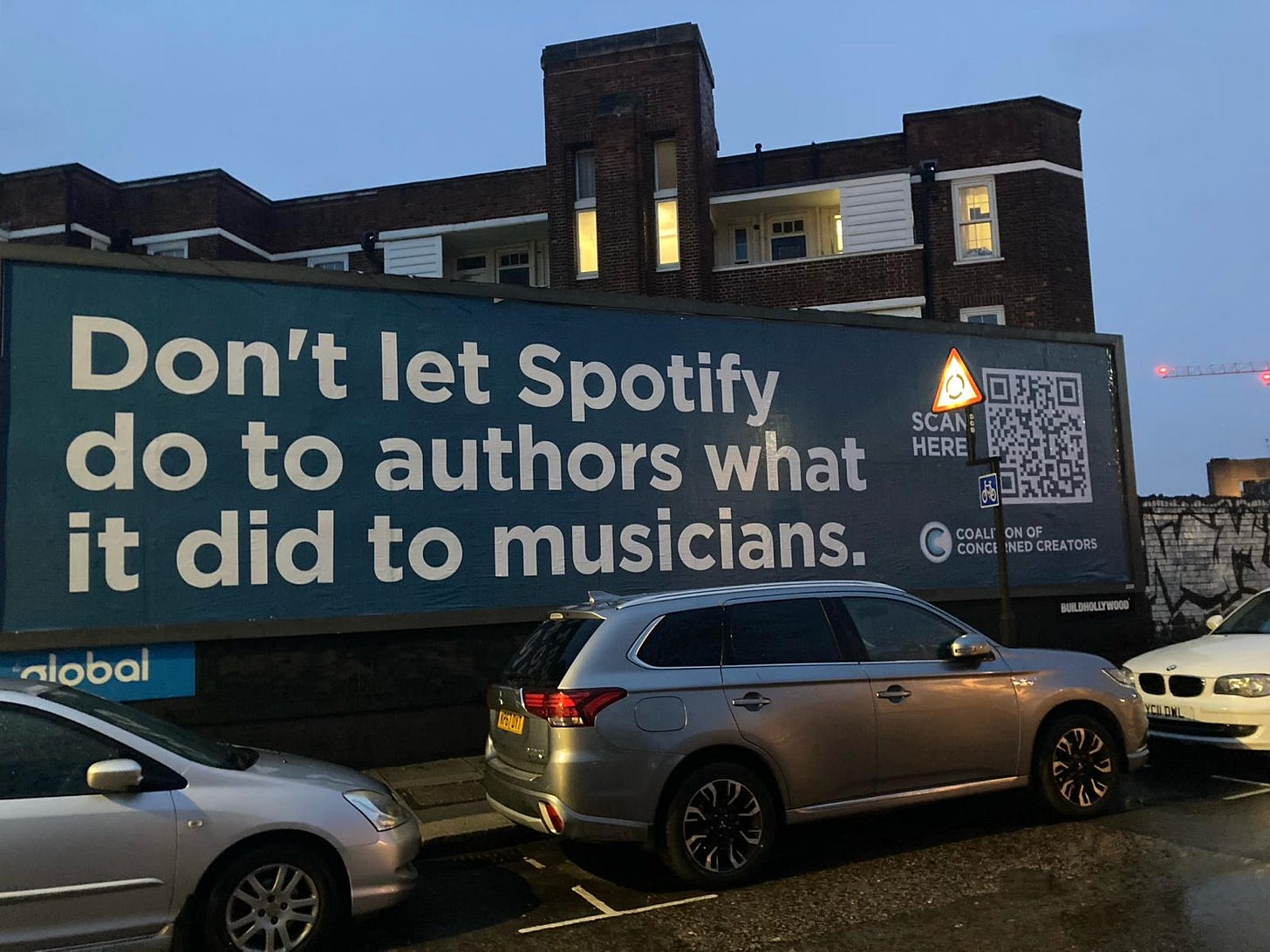Concerned Creators’ Takeaways from London Book Fair 2024
The Coalition headed to London for our first LBF to hear what the big Audio players had to say for themselves – including Spotify
As most of our subscribers and members know, the book world gathered last week at Kensington’s Olympia Center for the London Book Fair, one of the largest events in international publishing (that is, until Frankfurt). We’re still recovering from the broken AC *slightly kidding, but not really* but seriously, as a coalition, we learned so much from all the great panels and conversations we had with authors, creators, writers, associations, publishers and more.
Thank you to all of you who recognized our work, aligned with our concerns, and joined the cause while we were on the ground.
There is a lot to unpack from the three days of the Fair, but our primary purpose for going was to see all the audio players in action—namely, Storytel, Spotify, and Audible—while they were in one place and, lucky for us, actually all on one panel called “The Future of Audio In Publishing” on the second day of the Fair.
Arguably, the biggest takeaway from our perspective is that audio is on fire, streaming is a worry for many, and you guessed it: Spotify entering the arena is the biggest worry for most, given the devastating effect the tech company has had on musicians.
Amidst all the buzz on AI, it was reassuring to know that our members’ concerns surrounding streaming, and notably Spotify, aren’t just being amplified in this echo chamber, and so many folks out there have a general sense of anxiety around this issue.
Audio was a big focus of the second half of the Fair. On the Future of Audio in Publishing Panel last Tuesday afternoon, Michele Cobb, Executive Director of the Audio Publishers Association, shared some stats about the U.S. audiobook market:
"For the first time in 2023, our consumer survey showed that more than 50% of US adults have listened to an audiobook. This is a huge increase in the past couple of years, and going along with that, what publishers care about is that we've had double-digit revenue growth, and that's been for 11 years in a row."
The rest of this panel was the marketing talking points you would expect – Storytel focused on how their streaming offering boosts consumption (I’m sure it does when you’re making hardworking creator content essentially free), and Audible mainly discussed their original content and how they support local creators (we’ll have fun poking holes in that in another post).
Spotify was very quiet on this panel, particularly when a question was opened up to all the panelists about whether they would look at ads in audiobooks in the future. Storytel and Audible said it wasn’t a focus for them, but Spotify was the only participant not to answer. This is unfortunate from our perspective, given their advertising in books ambition could fundamentally change the format and the way books are written.
Outside of this panel, generally in our conversations, there was a lot of skepticism about how streaming could cannibalize author compensation and impact the future of this fast-growing format. In particular, most people were aligned in acknowledging the historical data points in music and other creative industries and validated their concerns with Spotify’s entry into the book space.
We appreciated the shoutout from Publishers’ Weekly on their audio recap story here:
“Spotify's audiobook launch has not come without criticism. Earlier this month, the company courted controversy with its new terms for its Findaway Voices service for independent authors appeared to overstep. Though the company quickly offered a clarification, authors remain vigilant. On Wednesday, the Coalition of Concerned Creators (CCC) issued a statement saying they were disappointed with being unable to question Smith directly during the panel. "We continue to be underwhelmed by Spotify’s transparency about their long-term ambitions for their product and this category as they continue to hide behind a guise of being creator-first—despite concrete historical examples of the platform being the opposite for musicians," said the statement. The CCC has bought several billboards around Olympia London, where the fair is being held, that say, "Don't let Spotify do to authors what it did to musicians."
Overall, and unfortunately, we didn’t anything new or reassuring from Spotify at the Fair. Their sponsored panel on Day Two focused on their existing talking points of growing the audience and being creator-first. Ya right.
The APA will release its latest data about the market's growth in a few months, and we’ll stay tuned for that. This might give us a better sense of Spotify’s offering's effect on audiobook sales and downloads and the impact on authors’ pockets.
And a special shoutout to Coalition member Matt Rubery for his awesome op-ed in The Independent UK, which went live on the first day of LBF and detailed how streaming could impact the way books are written. We encourage everyone to check it out!
In the meantime, we’re eager to learn more about Spotify’s ads in books ambitions, and please drop us a line @ concernedcreators@gmail.com if you want to discuss!





The approach by these streamers is, unfortunately, what I was expecting. I appreciate the focus on these events and we need to push in any way we can. We already have AI plagiarism and there is some hope in the form of the NYT lawsuit. A win there would be helpful in creating momentum for creators to be paid fairly and not treated like disposable content. I was upset enough by your initial report on Spotify that I canceled my subscription I have had for many years. Somewhere a line has to be drawn.